Latest fatal police shooting of Black teen has Chicago activists at crossroads
By Starla Muhammad -Managing Editor- | Last updated: Aug 18, 2016 - 2:33:30 PMWhat's your opinion on this article?
CHICAGO—Anger and frustration accompanied chants of “No justice, no peace, no racist police,” and “What if that was your son?,” shouted by protesters outraged by yet another fatal police shooting of an unarmed, young Black man in a city with a long, disturbing history of Chicago police officers’ violent and sometimes deadly interactions with the Black community.
Demonstrators took to the streets of downtown Chicago, Aug. 7, blocked traffic and eventually gathering at Millennium Park following a weekend of other protests by activists, youth and community groups reacting to the death of 18-year-old Paul O’Neal.
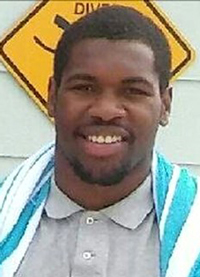
The teen was shot in the back and killed July 28 after crashing a reportedly stolen vehicle into a police car on the city’s South Side. Much of what transpired before and after was recorded by police dashboard cams and body cams worn by officers at the scene. But the body cam of the officer that fired the fatal shot was not recording. According to officials, the officers received the body cams about a week prior to the shooting. Several officers fired at least 15 times at the Jaguar Mr. O’Neal was in while he sped through a residential neighborhood.
Police officials including Chicago Police Superintendent Eddie Johnson, said officers appeared to violate department policy and have been relieved of their duties pending an investigation by the Independent Police Review Authority. In 2015 the deadly force policy utilized by Chicago police was revised and included stipulations that banned officers from firing at a vehicle, when the vehicle is the only danger. There is no timetable on how long the investigation may take.
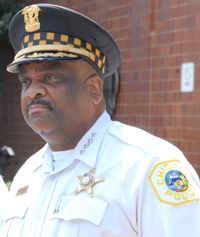
Chicago Police Superintendent Eddie Johnson
|
Officers are heard using profanities to describe Mr. O’Neal and stating the unarmed teen was shooting at officers. Footage shows the obviously injured young man not moving and lying flat on his stomach with blood on the back of his clothing while officers converge, shout at him not to move and handcuff him. One officer is overheard complaining that he will now have to be on “desk duty” for 30 days. The names of the officers have not been released.
Many applauded police for releasing video within eight days of the shooting compared to the 14 months it took to release video of the 2014 police shooting of Laquan McDonald, another unarmed Black teen whose death sparked massive protests last year. But this current attempt at greater transparency between law enforcement and community did not quell the shock of what footage revealed, especially in the aftermath of the shooting, said activists. Several young leaders were contacted by police officials to come to a meeting to view the video before it was released publically.
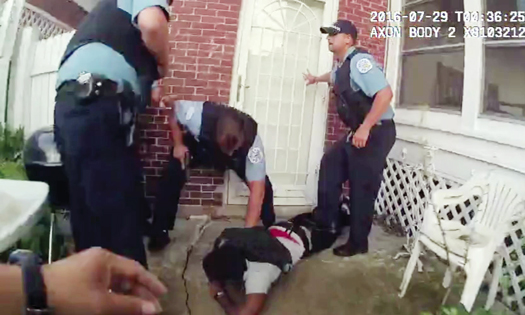
Video still of Chicago police surrounding Paul O’Neal, 18 after he was shot in the back by officers July 28. The teen ran from police after allegedly stealing a vehicle and crashing into a police squad are. His death has sparked protests around the city.
|
Disturbing and heartbreaking
“I feel like the police got another trophy today. I don’t feel like just because the video was released that, that was enough. That will never be enough. I’m hurt by it because I spend a lot of time trying to bridge the gap between the police and the community. So for the police to call me and ask me to come watch this video ‘before we put it out there’, my question to them was what do you expect from me after ya’ll release this? Ya’ll need God,” said Englewood resident Aleta Clark, CEO of Hugs No Slugs, an organization that works to foster better relationships between cops and residents. She was one of several activists that viewed the video at the meeting. Ms. Clark said she was sickened by the comments and reactions of officers after Mr. O’Neal was shot. She is angered because the officers in the video showed “no remorse” and police have a reputation of getting away with their misdeeds. Police were also observed shaking hands and giving one another high-fives in parts of the videos, others charged.
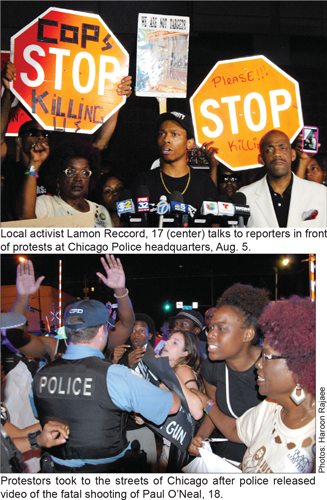
Photos: Haroon Rajaee
|
Despite the swiftness in which police released the video, activists like 17-year-old Lamon Reccord, who was friends and classmates with Mr. O’Neal, were not satisfied. He was one of several demonstrators who gathered in front of Chicago Police Headquarters on Michigan Ave. shortly after the release of the video. The activist told The Final Call he last spoke with his friend Paul in June and said the young man told him he wanted to change his life around and desired to be on a better path and road to success. Watching the video of what happened was disturbing and heartbreaking on so many levels, said Mr. Reccord.
“Seeing this video it should be an eye-opener for people across this nation and throughout the world that it’s time to abolish this law enforcement across the city of Chicago successfully and peacefully. Killing an officer doesn’t justify that Black Lives Matter and an officer killing an African American doesn’t justify that blue lives matter,” said Mr. Reccord.
“The way those officers … slaughtered Paul O’Neal, they gave the impression that they’re not us, they’re not human beings. They gave the impression that they’re not Chicago police officers that are dedicated to protecting and serving our people.”
Mr. Reccord said he had just visited with Mr. O’Neal’s family, spoke with his father and said they are holding up and trying to deal with what happened. He said the family will determine at a later date what they want to see in terms of justice for their slain loved one.
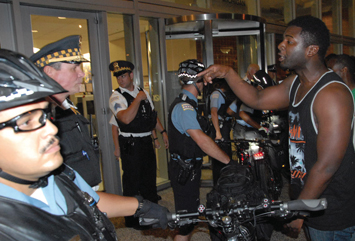
Demonstrator in front of police headquarters.
|
Many want the officers arrested, prosecuted, convicted and sent to prison. Others, called for the complete dismantling and abolishment of the entire public safety system in Chicago.
Dr. Ava Muhammad, an attorney and former prosecutor said there is no law where the penalty for stealing a car is death. When Caucasian boys steal a car it’s called “joyriding,” they are afforded due process of the law and given an opportunity to rehabilitate, Dr. Muhammad commented Aug. 7 during her weekly radio program “Elevated Places” broadcast on WVON 1690-AM.
“Now see there’s never, ‘stop, get out’ you never hear about verbal exchanges when it comes to Black people,” said Dr. Muhammad who is also student National Spokesperson for the Honorable Minister Louis Farrakhan and the Nation of Islam. “The U.S. Supreme Court has already held that when a suspect does not pose an immediate danger to the officer or public, you are not allowed to shoot at them ...you’re not only wrong to shoot at the suspect because he’s not a threat, you have no right to take his life.”
A city in a critical time
The presence of a Black police superintendent has not diverted concern and anger from those in the community who are intimately familiar with the history of Chicago Police, including the nightmare reign of former police commander Jon Burge. Mr. Burge and his Area 2 police “Midnight Crew” wreaked havoc on the Black community from the 1970s through the 1990s. It was during this time Burge and those under his authority were accused of physically abusing and torturing suspects to make them confess to crimes they did not commit and languish in prisons.
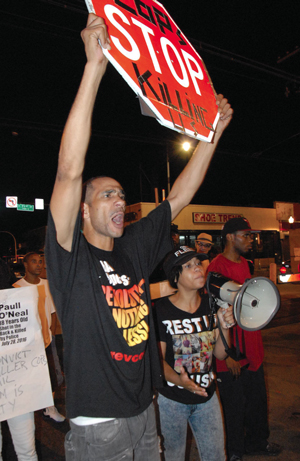
Protesters also blocked traffic on 71st and Jeffrey in the South Shore area where police shot Mr. O’Neal.
|
Martin G. Johnson is also a resident of Englewood and told The Final Call he heard about the shooting through his scanner that picks up police calls. He said he tries to monitor crimes in his neighborhood and the Woodlawn area and oftentimes goes directly to the scenes. According to Mr. Johnson, he heard a voice over his scanner telling officers to turn off all dash cams and body cams. When he arrived at the scene, police had already blocked off the area.
“What I did notice is that they called a firetruck and they were removing, dismantling people’s cameras off their homes,” he said.
“We will not allow the police to harass, stop and frisk, brutalize and kill us African Americans on a regular day basis. We as the people, as African Americans, we are standing on today that we are tired and dissatisfied with the ungracious leadership in our police department across the city,” Mr. Reccord told reporters outside police headquarters. “We do not need White officers policing the Black community on the South and West Side of Chicago.”
Longtime activist Zakiyyah Muhammad, of the Chicago Justice Or Else Movement said the community must pressure city officials to file charges against the officers responsible for the death of Mr. O’Neal. “They must be prosecuted, they must be sent to prison, it’s just that simple and we’re not going to stop protesting until that happens.” said Ms. Muhammad.
Nighttime Aug. 5 protests were at times raucous with some demonstrators boldly yelling in the faces of police officers, their anger and frustration evident. Young people blocked traffic and several linked arms across a section of railroad tracks on Jeffrey and 71st Ave. where a larger protest took place later that night.
Activist Pastor Jedidiah Brown said at this point there must be a collective conversation among Black leadership and activists about how to respond to this latest police shooting, including Nation of Islam Minister Louis Farrakhan as a “voice of direction”.
“I think people are so tired and we’re so hurt and so confused and people don’t know how to respond to it. I was almost brought to tears when I watched the video footage. All of my trust and security dealing with Chicago police is really torn today,” said Pastor Brown. He said even with the release of the video under the guise of “transparency” he believes there is a “hint of a cover up.”
Although Pastor Brown is not prepared to state this latest shooting has irreparably fractured police and Black community relations, he does believe the city is at a critical place.
“A lot of people would like to see the police department defunded, demilitarized and removed and we need a viable apparatus or system to replace it with before we have that conversation. I think that the activist community needs to have a real conversation about what we vision public safety to look like moving forward,” said Pastor Brown who carefully monitored interactions between some young protestors and police.
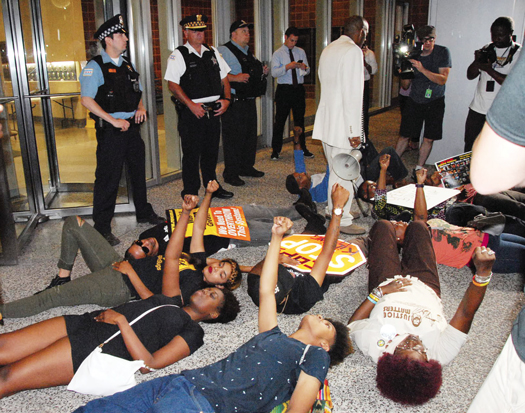
Young people stage a “die-in” in front of Chicago police headquarters Aug. 5 after video of the police shooting death of Mr. O’Neal was released to the public.
|
At times, the pastor stepped in between cops and zealous demonstrators to ensure tensions did not escalate. Some officers carried their batons openly and stared down protestors. Many young people shouted at police to “get out of the ‘hood, we don’t need you.”
“Tonight you have people out here. This is necessary to bring attention and awareness and to give the community an opportunity to express outrage. But it’s time for us to get strategic; it’s time for us to consider how we are spending our money. It’s time for us to build our own means of public safety to deal with this crisis that we’re in,” said Pastor Brown.
Ms. Clark said the death of Paul O’Neal has given her second thoughts when it comes to the work she does to try and foster better relationships between community and police.
“Just to see them shaking hands, smoking cigarettes, asking ‘did you get a shot, did you get a shot? I shot that motherfu@&er, I’m going to get 30 days of desk work,” she said, visibly upset. “You killed a Black man, who yes, broke the law but now you are bragging about it and the only f!*king thing that you’re worried about is you’re going to get desk duty?” added Ms. Clark.
“My question to the police department is why are your people trained to operate like that? How is that humane to operate like that?”
INSIDE STORIES AND REVIEWS
-
-
About Harriett ... and the Negro Hollywood Road Show
By Rabiah Muhammad, Guest Columnist » Full Story -
Skepticism greets Jay-Z, NFL talk of inspiring change
By Bryan 18X Crawford and Richard B. Muhammad The Final Call Newspaper @TheFinalCall » Full Story -
The painful problem of Black girls and suicide
By Charlene Muhammad -National Correspondent- » Full Story -
Exploitation of Innocence - Report: Perceptions, policies hurting Black girls
By Charlene Muhammad -National Correspondent- » Full Story -
Big Ballin: Big ideas fuel a father’s Big Baller Brand and brash business sense
By Bryan Crawford -Contributing Writer- » Full Story






 Click Here Stay Connected!
Click Here Stay Connected!








